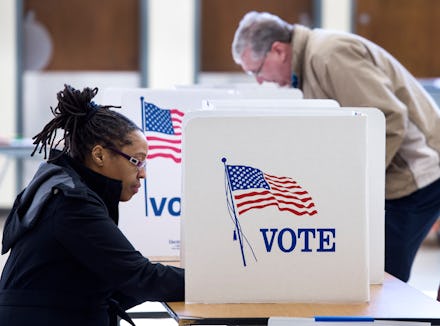The Movement for Black Lives is starting to mobilize black voters ahead of the 2018 midterm election

Before it’s time to head to the polls for the 2018 midterm elections, the Movement for Black Lives is launching a new effort called the Electoral Justice Project to give black organizers an opportunity to leverage as much political power as possible.
The Movement for Black Lives, a coalition of dozens of social justice organizations, said state-sanctioned violence and harmful policies that affect black communities across the United States are the catalysts for the creation of the Electoral Justice Project.
“We have witnessed in response to our organizing efforts, in response to the demand that black people get what they deserve, the re-emergence of white supremacist ideology and rhetoric,” Kayla Reed, a St. Louis-based organizer and co-leader of the Electoral Justice Project, said on a conference call announcing the initiative Monday night.
“We believe that 45 and his administration champions a far-right agenda that mocks the harm done to black communities, and we are already seeing how this current administration is seeking to undo the progress we’ve made by passing policies that seek to harm us,” Reed continued. “We need our own electoral strategy to give capacity to our movement and our folks, and that’s what we are building.”
How the Electoral Justice Project will work
The Electoral Justice Project will operate as a central “help desk” that provides local organizers with resources and technical support. Instead of focusing on one platform or policy nationally, the project will empower local organizers to take on issues that are most at stake where they live.
The most ambitious part of the Electoral Justice Project is the creation of a political program in 2018, which will be mobilized by an Electoral Justice League. The coalition will be made up of 15 people around the country who will receive intensive training on implementing political strategy and will partner with local organizations to carry out their specific needs and agendas. Applications for these positions open up in December.
“We want to connect you with people working on similar issues across the country to build energy and more capacity,” Rukia Lumumba, an adviser for the initiative, said. Lumumba co-managed the successful mayoral campaign for her brother Chokwe Antar Lumumba, current mayor of Jackson, Mississippi. The 34-year-old politician is the son of the city’s former mayor, the late Chokwe Lumumba, and is the youngest mayor in the city’s history.
The Electoral Justice Project has also tapped Jessica Byrd as a co-leader of the initiative. Byrd has worked in electoral politics for 15 years and specializes in executing political strategies for people of color centered-organizations and people of color running for office.
“In this political time, it is our duty to answer two political questions,” Byrd said on the conference call. “Is it possible to bring the clarity and radical vision that many of us have brought to the protest line to electoral justice and civic engagement? Two, can we interrupt a political system that’s taken advantage of our voices and fallen short to transform our communities?”
The Electoral Justice Project’s next steps
The Electoral Justice Project will kick off with town hall meetings in 50 cities from Nov. 5 to Nov. 7. The Movement for Black Lives invites changemakers to host dialogues at kitchen tables, churches, coffee shops and anywhere else black Americans feel safe to speak about the future of their communities. Those who are interested in hosting town halls will be provided with facilitator training so they can successfully gauge the issues that matter most in these communities.
All activity within the Electoral Justice Project will be nonpartisan and funded by grassroots efforts. “What you’ll hear about in our plan is not an allegiance to one party,” Byrd said. “It’s not an allegiance to one candidate. It’s not going to be specific to one policy platform. We pledge allegiance to our people.”
Educating and equipping black voters will be key to maintaining and increasing their participation in the 2018 midterm elections. There has been a slight downward tick in black voter turnout in past midterms: Between the 2012 midterm and 2014 midterm, black voter participation dropped from 13% to 12%, according to a Brookings Institution analysis. In 2018, people of color are expected to be one of many cohorts with lower participation rates compared to the 2016 general election, according to a July report from the Voter Participation Center and Lake Research Partners.
“This is our first chance to get back in the ring with 45, and when we swing we we want to win big,” Reed said.
More details on being involved and supporting the Movement for Black Lives’ Electoral Justice Project can be found here.